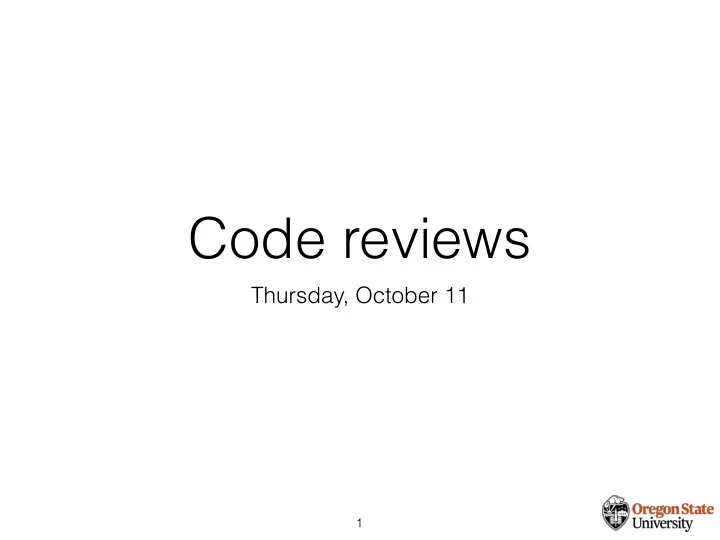

Code reviews Thursday, October 11 1
Announcements Sprint 2 is released Extra office hours on Friday,10-noon, in KEC 3057 2
Attribution Much of this material inspired by a great slides from Adam Badura, available here: https://cdn2-ecros.pl/event/codedive/files/ presentations/2015/Code-review.pptx 3
"Code review is having other people look at your code in order to find defects." 4
5
Pros and cons + prevents releasing bugs + ensures architecture quality + facilitates knowledge transfer in the team - time consuming - don't work when the reviewer don't know the domain - can hurt feelings 6
Formal Inspections Developed by Michael Fagan in the 1970's A very heavyweight process 4 roles and 7 steps 7
Formal inspection 8
Formal inspection It works, but it's very expensive ~9 person-hours per 200 lines of code Very impractical for today's realities 9
Light Weight approaches Over the shoulder Pair programming Pull requests 10
Over the shoulder Reviewer sits with the developer and looks "over their shoulder" at the code The reviewer can give informal feedback which can be incorporated immediately (if possible). 11
Over the shoulder + Easy to implement + Easy to complete + Easy to quickly incorporate changes - Reviewer cannot review at their own pace - No Verification - Reviewer only sees what the developer shows them 12
Pair Programming Code is written by a pair of developers. Code Review is "baked into" the process 13
Pair programming + Great for finding bugs and promoting knowledge transfer + Review is in-depth - Reviewer is not objective - Hard to do remotely - No verification 14
Pull Requests Code is peer reviewed as part of the PR process No PR should be merged without being reviewed by at least on other developer 15
Pull Request Code Reviews + Can be enforced by Version Control Practices + PR serves as a verification of a review + Can be done asynchronously (great of remote teams!) + Reviewers can see the whole source code. - Changes by hard to understand without explanation - Important changes can be lost with a lot small insignificant changes 16
Best practices: design Single Responsibility Principle Code Duplication (copy/paste) Squint Test Left Code Better? Potential Bugs / Missing tests Error Handling Efficiency 17
Best Practices: style Method Names Variable Names Method length Class Length File Length Commented Code Number of Method Arguments Readability 18
Best Practices: Testing Test Coverage Testing at the right level Number of mocks Meets requirements 19
Practical Suggestions Review < 400 LOC at a time Don't review for > 60 minutes at a time Use a Peer Review Checklist (language/domain specific) Follow up with the review comments. 20
Helpful Tools https://www.codereviewhub.com/ https://www.jetbrains.com/upsource/ https://www.reviewboard.org/ https://reviewable.io/ https://www.gitcolony.com/ https://www.review.ninja/ 21
Pair Programming 22
Extreme Programming One the first agile methods TDD, continuous integration, refactoring were originally introduced by XP. 23
XP Practices Pair Programming TDD Continuous Integration Refactoring Small Releases Coding Standards Collective Code Ownership Simple Design Sustainable Pace 24
Pair programming 2 programmers, 1 computer Driver: Controls keyboard & mouse Deals with the details Navigator: Thinks at a higher level Watches for typos, logical errors Switch off every 10-20 minutes 25
Why? Fewer defects Higher design quality Higher job satisfaction Shared knowledge Team-building and communication is enhanced Raises your team's bus number 26
Why not? Two developers cannot be physically present Strong personal conflicts Task is simple and not challenging When participants need a break 27
Recommend
More recommend